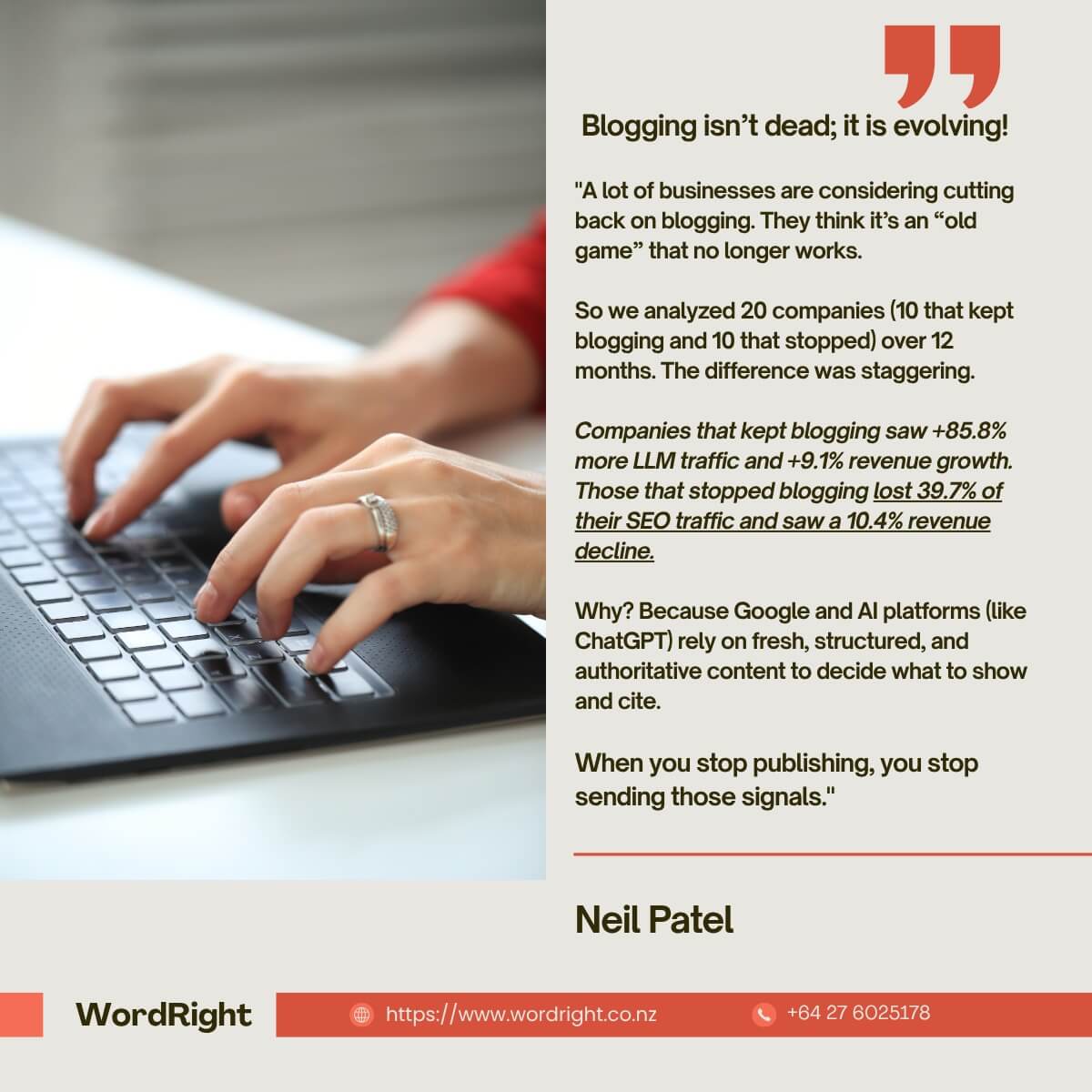Lessons from John Steinbeck and AI
In The Grapes of Wrath, John Steinbeck paints a haunting picture of tenant farmers being forced from their land, not by a neighbour they could confront, but by an invisible power: “the bank” or “the company.” This faceless force decides who stays and who starves; it was a system that forgot people.
“The bank is something else than men. It happens that every man in a bank hates what the bank does, yet the bank does it. The bank is something more than men, I tell you. It’s the monster. Men made it, but they can’t control it.”
Fast-forward to 2025 and replace “the bank” with the algorithms and AI systems that govern digital traffic. Businesses, like Steinbeck’s farmers, can’t negotiate with these forces; they must adapt or risk being left behind.
Why your business should keep blogging in 2026
Many businesses are considering cutting back on blogging. They believe it’s an unnecessary expenditure, an old-fashioned approach that is no longer effective. However, the data says otherwise: maintaining a consistent blogging strategy pays off in both traffic and revenue.
Neil Patel’s 2025 analysis of 20 B2B companies over 12 months found striking differences between those that kept blogging and those that stopped.
- Active bloggers saw an 85.8 % increase in AI/LLM traffic and 9.1 % revenue growth.
- Inactive sites lost 39.7 % of their SEO traffic and suffered a 10.4 % revenue decline.

- SEO traffic declines faster and recovers more slowly when publishing halts.
- AI-driven discovery in the form of citations and traffic from LLMs strongly favours fresh, authoritative, well-structured content.
What is an LLM and how does it affect SEO?
LLM stands for Large Language Model, AI systems trained on massive amounts of digital text. Examples include ChatGPT, Google Gemini, Anthropic Claude, and Perplexity AI. These tools can read, understand, and generate human‑like responses to questions.
Instead of showing a list of links, LLMs generate conversational answers, often citing or summarising trustworthy websites behind the scenes. When someone asks, “Who is the best website designer for small businesses in Auckland?” an LLM composes an answer that may feature snippets from authoritative blogs, potentially yours, if your content is up‑to‑date and structured.
How are LLMs reshaping SEO?
AI‑driven platforms now act as gatekeepers of information. When people ask ChatGPT, for example, a question, those systems draw from content that is:
- Fresh
LLMs draw from recent data and favour content updated within the last six to twelve months. Out-of-date articles slip out of the AI’s reference range. - Structured
Clear subheadings (H2/H3), bullet points, FAQs, and schema markup help AIs read and interpret topics properly. - Authoritative and transparent
LLMs look for credible sources such as clear bylines, citations, and original insights as signals of expertise. - On topic
AI models spot patterns, and these clusters earn trust. Multiple interconnected posts on one theme (for example, “SEO” or “proofreading”) prove deep expertise.
Traditional SEO attracts humans; AI‑optimised SEO ensures algorithms can also read, summarise, and reference you. Optimising for both search engines and AI systems is now essential.
The compounding advantage of consistent blogging
Let’s use a banking analogy. Each blog post is an investment. Like compound interest, the benefit grows over time. Every blog post strengthens your domain’s topical authority. This is how they help:
- More opportunities for AI citations and featured snippets.
- Stronger internal link networks for both readers and crawlers.
- Increased long‑tail traffic that stacks year on year.
- More trust and conversions as your topical authority deepens.
Companies that stop blogging face a double penalty: declining SEO and minimal LLM growth.
How website copy affects leads and conversions
A good‑looking website is only part of the equation; it’s the copy that does the heavy lifting. Well‑written, SEO‑focused content attracts visitors, keeps them engaged, and then converts them into paying clients. With AI‑powered search now reshaping how people find businesses, structured and keyword‑optimised copy matters more than ever.
Can your business afford not to keep blogging?
Just as Steinbeck’s farmers couldn’t fight the monster bank, today we can’t fight the algorithms. But we can work with them by feeding them what they value most: fresh, structured, authoritative content.
As NP Digital notes:
“The companies that maintained content consistency through market uncertainty emerged stronger, not weaker. They captured market share, built LLM visibility, and positioned themselves as ongoing authorities rather than historical footnotes.
The real costs of not blogging
If your competitors are blogging consistently, they’re not just getting more clicks, they’re building authority that AI systems will cite for months and years. Every post is a long-term investment in traffic, revenue, and visibility.
If your site isn’t getting the leads and traffic it should, WordRight can breathe new life into your blogs and website pages—giving existing posts a second chance to attract, inform, and convert.
Our blog‑writing and optimisation services include:
- Re‑formatting old posts for clarity, readability, and SEO.
- Updating language, statistics, and outbound links.
- Adding optimised images and rewriting alt‑text metadata.
- Including local or industry‑specific context where useful.
- Crafting subheadings that anticipate common AI/voice‑search questions.
- Loading and publishing content for you, or delivering ready‑to‑go posts.
Refreshing and optimising existing blog content is often faster and more effective than starting from scratch.
Typical results include:
- Higher organic and AI‑driven traffic.
- Increased time on site and lower bounce rates.
- Improved engagement for mobile or scanning readers.
- Greater likelihood of appearing in AI or Google snippet boxes.
- Enhanced authority and credibility in your field.
See what other WordRight clients have said .
Still have questions?
The evidence is clear: consistent blog publishing drives measurable business results in 2025. Companies maintaining regular content achieved 9.1% revenue growth while competitors who stopped saw 10.4% revenue decline.
The big advantage of consistent blogging over other social media channels: it creates permanent, indexable assets that serve both traditional search and AI discovery systems. While other content formats support awareness, blogs remain the foundation for organic lead generation and LLM citations.
WordRight can help. We plan, write, and optimise blog content that gets discovered by people and by LLMs so you stay visible as algorithms evolve
If you’d like to discuss how consistent, optimised content can keep your business visible in 2025, call 027 6025 178 or send me an email.

